
Denigrating & Damaging Reputation in Nigeria: The Legal Implications of False Posts on Social Media
By Emma Moe | October 2025
In today’s digital Nigeria, reputation can be built or broken with a single post. The rise of influencers and online commentators has created new avenues for publicity but also for reputational harm. Many individuals now find their names dragged through the mud by posts that are often false, misleading, or shared without consent.
Understanding Reputation and Defamation
Under Nigerian law, defamation law protects a person’s reputation, covering both libel (written defamation) and slander (spoken defamation). The law upholds every individual’s right not to be unjustly attacked or falsely represented in any way that damages their standing in the eyes of others.
Online defamation, or digital libel, has become increasingly common with the spread of social media platforms like X (Twitter), Instagram, and TikTok. Influencers, bloggers, or content creators who share damaging or false information about others can face severe civil and even criminal consequences.
Applicable Nigerian Laws
- Criminal Code Act (Sections 373–381): Defines and penalises defamation as a criminal offence, particularly when publication is intended to harm reputation.
- Cybercrimes (Prohibition, Prevention, etc.) Act, 2015: Section 24(1)(b) prohibits sending false messages that cause annoyance, inconvenience, danger, or injury to reputation.
- Constitution of the Federal Republic of Nigeria, 1999 (as amended): Section 39 guarantees freedom of expression, but not at the expense of another’s dignity and reputation (protected under Section 34).
Notable Nigerian Case Laws
- Dafe v. Asak (2004) 6 NWLR (Pt. 868) 1: The court held that publication of false statements capable of lowering a person’s reputation constitutes actionable defamation.
- Odogwu v. A-G Federation (1996) 6 NWLR (Pt. 456) 508: Affirmed that truth is a complete defence to defamation, but malice or reckless disregard for truth can still attract liability.
- Ajayi v. Total Nigeria Plc (2013) LPELR-20898(CA): Highlighted the need for defendants to prove fair comment or qualified privilege where they claim to be acting in public interest.
- Kemi Olunloyo v. Pastor David Ibiyeomie (2017): A well-known blogger was arrested for alleged defamation after publishing stories deemed false. The matter drew national attention and reminded Nigerians that online speech carries consequences.
- Nollywood Defamation Claims: Several celebrities have recently threatened or filed defamation suits against blogs and influencers who published unverified personal claims, highlighting the rising trend of online accountability.
When Influencers Cross the Line
In Nigeria, influencers are now considered media figures. If they share defamatory content, even by reposting or commenting on false information, they can be held liable. The courts have made it clear that forwarding or “reposting” unverified defamatory material still constitutes publication in the eyes of the law.
Such actions not only violate the Criminal Code but can also result in lawsuits seeking damages for reputational harm, emotional distress, and loss of business opportunities.
What Victims Can Do
- Send a cease and desist letter through your lawyer.
- Request the post’s removal and issue a public retraction.
- File a civil action for defamation seeking damages.
- Report the offence under the Cybercrime Act for possible prosecution.
Protecting Yourself as an Influencer
Influencers and digital creators must verify information before sharing it. Adding disclaimers like “as alleged” or “unverified report” may not protect you if the content ultimately damages someone’s reputation. Always fact-check, obtain consent when sharing personal content, and consult legal professionals when in doubt.
Conclusion
To begin with, denigrating or damaging someone’s reputation online is not only unethical but also capable of attracting both civil as well as criminal liability in Nigeria. Moreover, while social media may amplify your voice, the law, nevertheless, ensures it does not do so at the expense of another’s dignity. Ultimately, freedom of speech comes with responsibility, and therefore, the Nigerian courts continue to balance both carefully in the digital age.
Disclaimer: This article is for general information only and does not constitute legal advice. For specific cases, consult a qualified Nigerian lawyer.
